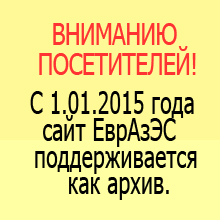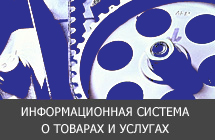|
RULES OF PROCEDURE for the Inter-parliamentary Assembly of Eurasian Economic Community APPROVED by Resolution of the EurAsEC Inter-parliamentary Assembly 2 November 2002, No. 3–7
RULES OF PROCEDURE for the Inter-parliamentary Assembly of Eurasian Economic Community (as amended on 30 May 2007)
The Rules of Procedure of the Inter-parliamentary Assembly of the Eurasian Economic Community (hereinafter referred to as the Rules of Procedure) determines in accordance with the Treaty on the Establishment of the Eurasian Economic Community of 10 October 2000 (hereinafter referred to as the Treaty), and the Regulations of the Inter-parliamentary Assembly of the Eurasian Economic Community (hereinafter referred to as the Regulations), organizational arrangement and operational procedures of the Inter-parliamentary Assembly of the Eurasian Economic Community (hereinafter referred to as EurAsEC or the Community).
Chapter I. COMPOSITION OF THE ASSEMBLY
Article 1
1. The Inter-parliamentary Assembly of the Eurasian Economic Community (hereinafter referred to as the IPA or the Assembly) is composed of members of parliaments delegated by the parliaments of the Community member states in accordance with the parliaments’ bylaws and procedural rules. 2. Scope of authority of the delegated parliamentarians and duration of their tenure are determined by the national parliaments. When necessary, the authority of a member of the Assembly may be delegated to another envoy of the national parliament. 3. The headcount of parliamentary delegations at the IPA is as follows: Republic of Belarus – 16 Parliamentarians, Republic of Kazakhstan – 16 Parliamentarians; Kyrgyz Republic – 8 Parliamentarians; Russian Federation – 42 Parliamentarians; Republic of Tajikistan – 8 Parliamentarians; Therewith, every parliamentarian has one vote.
Chapter II. COMPETENCE OF THE ASSEMBLY
Article 2
1. The Assembly performs the following functions within its authority: – elaborating and approving drafts of the fundamentals of legislation relating to basic legal relations and sending it to the Integration Committee, to be subsequently introduced, as appropriate, to the Interstate Council of EurAsEC for review; – elaborating and adopting model laws to serve as a basis for elaboration of the national legal codes by the Community member states; – reviewing questions relating to adjustment of the legal codes of the Community member states to the treaties concluded within the framework of EurAsEC; – developing recommendations on harmonization (convergence, unification) of the legal codes, and proposals as to synchronization of procedures for adoption of laws at the parliaments of the Community member states; – reviewing queries and recommendations of the Interstate Council and the Integration Committee, and reports of the Integration Committee on progress in the achievement of the objects and purposes of the Community; – submitting recommendations to the Interstate Council, queries and recommendations – to the Integration Committee and the parliaments of EurAsEC member states, and queries – to the Community Court; – recommending to the parliaments of the Community member states to grant priority review to legislative acts that must be adopted or amended in order to have resolutions of the Interstate Council and the Inter-parliamentary Assembly, and international treaties concluded within the framework of the Community, implemented; – summing up and systematizing legal information and ensuring exchange thereof between the parliaments of the Community member states; – ensuring interaction between the parliaments of the Community member states; – interacting with international parliamentary and other organizations, concluding cooperation agreements with them; – appointing, on a proposal by the Interstate Council, judges to the Community Court; – sending to the Interstate Council annual reports on the Assembly’s activities relating to legal support of the development of the Community; – contributing to the drawing-up and revision of the budget estimates of the Community, – performing other functions in accordance with its objects and purposes. 2. The Assembly independently resolves questions within its purview as established by the Treaty and the Regulations, and questions referred to it by the Interstate Council.
Chapter III. Composition of the Assembly
Article 3
Administration of the IPA operations is implemented by the Bureau of the Inter-parliamentary Assembly, formed by the Assembly from parliamentarians delegated by parliaments of the Community member states (two members from each parliament), including the Chairman and deputies of the Chairman of the Inter-parliamentary Assembly.
Article 4
In pursuance of the preparation and initial review of drafts of the fundamentals of legislation, model laws, and other issues, the Assembly forms standing and provisional committees composed of members of the IPA, and forms the subsidiary organs necessary for the performance of functions assigned to the Assembly.
Article 5
The Secretariat of the Inter-parliamentary Assembly of EurAsEC is be the permanent executive body of the IPA and the Bureau of the IPA, responsible for administrative support thereof. The Secretariat is composed of the Executive Secretary, his deputies, and the staff providing administrative support for the Assembly and its organs. 2. The Executive Secretary, appointed by the Bureau of the IPA, guides the Secretariat of the IPA. 3. Representatives of the states (parliaments) – EurAsEC members at the Assembly, appointed on recommendation of the parliaments of the Community member states and permanently tenured, have the rank of deputies of the Executive Secretary of the IPA in charge of interaction with the national parliaments. 4. The Secretariat of the IPA conducts its affairs in accordance with the Regulations of the Secretariat of the Interparliamentary Assembly. 5. The Secretariat of the IPA interacts with the Secretariat of the Integration Committee with respect to questions of harmonization (convergence, unification) of the national legal codes, legal groundwork for integration, legislative work and other questions. 6. The Executive Secretary of the IPA, envoys of EurAsEC member states (parliaments) at the Assembly, deputies of the Executive Secretary and employees of the Secretariat of the IPA enjoy privileges and immunities within limits as established by the Convention on Privileges and Immunities of Eurasian Economic Community of 31 May 2001.
Chapter IV. Chairman of the Assembly and his deputies
Article 6
The Chairman of the Assembly is elected at a meeting of the Assembly from the ranks of the heads of the parliaments (chambers of the parliaments) of the Community member states, as a general rule, for a two-year term on a rotation basis. The Assembly Chairmanship rotates in the Russian alphabetical order of the names of EurAsEC member states. Deputies of the Chairman of the Assembly are elected from the ranks of the heads of the parliaments (chambers of parliaments) of the Community member states.
Article 7
The Chairman of the Assembly: a) chair meetings of the Assembly and the Bureau of the Assembly; b) guide the Assembly on the basis of resolutions adopted by the Assembly and the Bureau of the Assembly; c) participate in meetings of the Interstate Council and the Integration Council, representing thereat the position of the Assembly with respect to questions relating to the development of the Community; d) coordinate cooperation with other EurAsEC organs; e) interact with the Council of the Interparliamentary Assembly of the member states of the Commonwealth of Independent States; f) on recommendation of the Secretariat of the IPA, approve composition of task groups and groups of experts recruited for preparation or expert evaluation of the drafts of documents or for investigation and collation of other questions; g) submit to the Assembly for review declarations, appeals, and agreements; h) submit to the Bureau of the Assembly for approval the Regulations of the Secretariat of the IPA of EurAsEC and a candidature for the office of Executive Secretary of the Assembly; i) submit to the Bureau of the IPA of EurAsEC annual reports about the Assembly’s activities; k) sign documents adopted by the Assembly and the Bureau of the Assembly; l) perform representative functions assigned to him by the Assembly or the Bureau of the Assembly; m) issue orders and give instructions with respect to questions within his purview; n) perform other functions assigned to him under the present Rules of Procedure or by the Assembly.
Article 8
When the Chairman of the Assembly is absent, his duties are performed by the Deputy Chairman of the Assembly from a state whose name in the Russian alphabetical order follows the name of EurAsEC state from which the Chairman is delegated.
Chapter V. BUREAU OF THE ASSEMBLY
Article 9
The Bureau of the Assembly: a) convenes meetings of the Assembly; b) drafts agendas for regular meetings of the Assembly, provide the administrative underpinning of the work of the Assembly; c) submits to the Assembly for review proposals as to candidatures for the office of the Chairman of the Assembly and his deputies; d) coordinates activities of the standing and provisional committees and other organs of the IPA; e) makes decisions with respect to creating under the auspices of the Assembly councils of academic experts in accordance with the competencies of the standing committees; f) ensures execution of the Assembly’s decrees; g) monitors implementation of resolutions adopted by the Bureau and the Assembly; h) makes decisions as to the conduct of theory-and-practice conferences, seminars and other events; i) makes decisions as to dispatching delegations from the Assembly and receiving parliamentary delegations; k) determines structure and operational procedures of the Secretariat of the IPA in accordance with the headcount approved by the Interstate Council; l) appoints the Executive Secretary of the IPA and his deputies; m) makes decisions on others questions relating to administrative arrangements of the Assembly and its organs in accordance with the present Rules of Procedure and decrees adopted by the Assembly.
Article 10
1. The Bureau of the Assembly holds its meetings as necessary, but at least two times every year. 3. The time and date for the conduct of a regular meeting of the Bureau of the Assembly are determined, as a general rule, at a preceding meeting of the Bureau. 4. Extraordinary meetings of the Bureau may be convened on initiative of the Chairman of the Assembly, the parliaments, one or several members of the Bureau, a standing committee. In such event, a statement setting forth a rationale for the convocation of an extraordinary meeting of the Bureau is sent, and drafts of the agendas and decrees on questions brought up for discussion shall be submitted, to the Chairman of the Assembly. The time and date of the conduct of an extraordinary meeting are determined by the Chairman of the Assembly by agreement with members of the Bureau. Article 11
2. The following parties attend meetings of the Bureau of the Assembly in a consultative capacity: a) chairmen of the standing committees of the Assembly or, under the chairmen’s instruction, deputies of the committee chairmen or members of the committees; b) the Executive Secretary of the IPA of EurAsEC; c) envoys of EurAsEC member states (parliaments) at the Assembly. 2. The following parties may attend public meetings of the Bureau of the Assembly: a) heads of the Community organs, the Secretary General of EurAsEC or persons authorized by him; b) chairmen of the provisional committees of the Assembly or, under the chairmen’s instruction, deputies of the committee chairmen or members of the committees; c) members of the Assembly; d) heads of the organs of state power of the Community member states or persons authorized by them; e) the Secretary General
of the Council of the Interparliamentary Assembly of member states of the f) plenipotentiaries of states and international organizations granted the status of observer with EurAsEC, and persons invited by the Chairman of the Assembly; g) representatives of the mass media. 3. Employees of the Secretariat of the IPA of EurAsEC and other persons attend meetings of the Bureau of the Assembly in accordance with duties assigned to them.
Article 12
The Bureau of the Assembly upon the proposal of one or several members of the Bureau may resolve to hold a closed meeting. Only persons invited by the Bureau of the Assembly attend closed meetings.
Article 13
1. Resolutions of the Bureau of the Assembly are adopted by consensus, with one parliament having one vote. 2. Any member of the Bureau may submit that his parliament (chamber of parliament) is uninterested in a particular question, which shall not bar adoption of a resolution [on this question]. Such a submission shall be recorded in the protocol. 3. Results of voting on a resolution are recorded in the protocol of the meeting. 5. Resolutions of the Bureau are issued as decrees, signed by the Chairman of the Assembly.
Chapter VI. STANDING AND PROVISIONAL COMMITTEES OF THE ASSEMBLY
Article 14
The standing committees of the Assembly shall conduct its affairs pursuant to the Regulations of Standing Committees of the IPA of EurAsEC approved by the Assembly, and they: a) prepare and initially review drafts of the fundamentals of legislation relating to basic legal relations, model laws and other documents, and introduce them at meetings of the Assembly and the Bureau of the Assembly; b) review other questions within its purview.
Article 15
The time and date, and the tentative agenda of a regular meeting, as a general rule, are determined at a preceding meeting of the Committee. 2. The chairman of a standing committee by agreement with the Bureau or the Chairman of the Assembly may convene an extraordinary meeting of the standing committee.
Article 16
A meeting of a committee is deemed to have a quorum if it is attended by a minimum of 50% of the members of the committee, with envoys from every parliament participating therein. Article 17
1. Provisional committees are established pursuant to a decree of the Bureau or the Assembly, for the purpose of resolving specific questions relating to the operation of the Assembly. 2. Provisional committees are discontinued after having achieved goals set for them or ahead of schedule pursuant to a resolution by the Bureau or the Assembly.
Article 18
1. The standing and provisional committees are composed of members of the parliamentary delegations from each of the Community member states. When necessary, the authority of a member of a standing committee may be delegated to another envoy of the national parliament. 2. The work of a committee is administered by the chairman of the committee, elected by members of the committee from their ranks by open ballot, as a general rule, for a two-year term on a rotation basis.
Chapter VII. ADMINISTRATIVE ARRANGEMENTS OF THE ASSEMBLY
Article 19
1. The Assembly holds regular meetings once every year. As a general rule, the place and time of a meeting, as well as the tentative agenda thereof are determined at a preceding meeting of the Assembly. In the event the conduct of a regular meeting in the place and time previously determined is unfeasible, the Chairman of the Assembly with concurrence of all members of the Bureau of the Assembly determines a new place and time for the meeting. 2. An extraordinary meeting of the Assembly may be convened by the Bureau of the Assembly on the Bureau’s own initiative, upon resolution of the Interstate Council, upon proposal of the Chairman of the Assembly or upon demand of one or several parliamentary delegations. 3. Announcements about place and time of the conduct of a meeting of the Assembly, and relevant materials are sent to heads of the parliaments (chambers of parliaments), as a general rule, no later than one month prior to the beginning of the meeting.
Article 20
1. As a general rule, meetings of the Assembly, the Bureau and other organs of the IPA are public. Closed meetings of the Assembly are held upon proposal of the Bureau of the Assembly or one or several parliamentary delegations. 2. The media may attend only public meetings.
Chapter VIII. AGENDAS OF MEETINGS OF THE ASSEMBLY
Article 21
1. The Bureau of the Assembly drafts the agenda of a meeting on the basis of proposals from the parliaments, standing committees of the Assembly, and EurAsEC organs. 2. The agendas are approved at the meetings of the Assembly. 3. Proposals as to amendments to the agenda of a meeting of the Assembly submitted immediately in the course of that meeting are adopted by a qualified, two-thirds majority of votes from the number of the Assembly members present at the meeting,
Chapter IX. speakers’ rights at Assembly meetings. operational procedures. proposals as to procedures
Article 22
Members of the Assembly may take the floor only with consent of the chair of the meeting. In the course of a meeting the chair allows every parliamentarian to take the floor. The debate may be discontinued only if this condition is observed.
Article 23
1. The duration of one presentation should not exceed 10 minutes, unless the Assembly resolves otherwise. 2. Proposals on projects under discussion are submitted in writing at the start of the meeting or in either oral or written form in the course of discussion.
Article 24
1. Members of the Assembly, except the presenters, take the floor in the order in which they have requested to speak. The presenters are appointed by a decision of the Bureau of the IPA or the standing committee and take the floor in the order established in the agenda. 2. Members of the Assembly ask the chair of the meeting for the floor in advance in either written or oral form, or immediately in the course of the meeting. 3. The chair of the meeting ensures observance of the Rules of Procedure in the course of a discussion. In the event a speaker deviates from the question discussed, breaks the procedural rules or uses inappropriate language, the chair may give a warning or rule the speaker out of order and propose to the parliamentary delegation to have him replaced.
Article 25
a) postpone the discussion; b) have the meeting terminated or postponed; c) change the procedural rules of the meeting is given the floor in the first instance. 2. Proposals as to procedural questions are given priority over substantive questions, the discussion of which shall be interrupted for a period while procedural questions are deliberated. Speakers on procedural questions briefly states their reasons without touching on the substance of the question discussed.
Chapter X. ADOPTION OF RESOLUTIONS BY THE ASSEMBLY. QUORUM
Article 26
1. With respect to questions within its purview, the Assembly adopts resolutions by a qualified majority of two-thirds from the Assembly’s membership present at the meeting, and with respect to procedural questions, by a simple majority. In the event the voting yields a two-thirds majority of votes but members of any two parliamentary delegations vote against adoption of the resolution, the question are submitted for additional review to the relevant standing committee of the IPA. 2. The Assembly may adopt a resolution to bar from voting members of the IPA delegated by the parliament of a state whose arrears exceed the sum equal to the state’s annual assessed contribution to the Assembly’s budget.
Article 27
1. The Assembly adopts acts in the form of decrees. With respect to organizational questions, the Assembly may adopt protocol resolutions. 2. The Assembly adopts resolutions only at the meetings. 3. Resolutions, as well as declarations, appeals, recommendations and proposals adopted by the Assembly are sent to parliaments of the Community member states and the Community organs, and whenever necessary, to the Interparliamentary Assembly of the Commonwealth of Independent States and the Parliamentary Assembly of the Union of Belarus and Russia. Model laws adopted by the Assembly are sent for review to parliaments of the Community member states. 4. The originals of resolutions of the IPA are kept in the archive of the Assembly.
Chapter XI. PROCEDURES FOR ELABORATION, REVIEW AND IMPLEMENTATION OF THE FUNDAMENTALS OF LEGISLATION, MODEL LAWS AND OTHER ACTS
Article 28
1. Drafts of the fundamentals of legislation, model laws and other documents are submitted to the Assembly for review by parliaments of the Community member states, standing committees of the Assembly and the Integration Committee. 2. Drafts of the fundamentals of legislation and model laws are sent to the Secretariat of the Assembly along with a statement of reasons for adoption thereof. These materials contain an analysis of legislation in force in the Community member states in similar areas of legal regulation, reasons for convergence of the legal codes in this particular realm, and a predictive judgment as to possible legal and other consequences of adoption or non-adoption of the submitted draft law. 3. The Secretariat of the Assembly organizes legal expertise of drafts of the fundamentals of legislation, model laws and other documents and shall present to the Bureau of the Assembly expert evaluations as to conformity of the drafts with fundamental documents governing cooperation between the Community member states and the operation of the Assembly, and whenever necessary, expert evaluations as to conformity of the drafts with the principles and norms of international law. 4. Drafts of the fundamentals of legislation and model laws are sent for review to the Integration Committee in accordance with questions within its purview.
Article 29
1. Drafts of the fundamentals of legislation are elaborated and adopted in the order established in the relevant treaty between the Community member states. 2. Procedures for preparation and discussion of model laws by standing or provisional committees of the Assembly are determined by the committee independently. Upon a resolution of the committee, model laws are sent for approval and conclusion to parliaments of the Community member states. 3. The Bureau of the Assembly and the committees may arrange for independent expert evaluation of drafts of the fundamentals of legislation and model laws.
Article 30
1. The committees submit for review to the Assembly drafts of the fundamentals of legislation, model laws and other documents and accompanying material no later than 30 days prior to the meeting.
Article 31
Drafts of the fundamentals of legislation, model laws and other documents are included in the agenda of an Assembly’s meeting and discussed thereat in the manner prescribed in the present Rules of Procedure. Article 32
The Assembly approved drafts of the fundamentals of legislation relating to basic legal relations are sent to the Integration Committee, to be subsequently introduced, as appropriate, to the Interstate Council for review. After adoption by the Interstate Council and implementation of relevant intrastate procedures the fundamentals of legislation are incorporated into the legal codes of the Community member states.
Article 33
1. Model laws adopted at the Assembly’s meetings are recommended for use in parliaments of the Community member-states. 2. Parliaments of the Community member-states inform the Assembly about specific rules and procedures established for use of the model laws. 3. The parliamentary delegations at every regular meeting brief the Assembly on the implementation of intrastate procedures with regard to agreements adopted by the Interstate Council and the fundamentals of legislation, about results of utilization by the parliaments of the norms of model laws and adoption on the basis thereof of statutory regulations by the Community member states, with a special item on the agenda of the Assembly’s meeting reserved for such briefings. 4. Upon results of review by parliaments of the Community member states of the fundamentals of legislation and model laws, the Assembly may resolve to provide additional information.
Chapter XII. PROCEDURES FOR PARTICIPATION OF REPRESENTATIVES OF NON-ASSEMBLY ORGANS IN THE WORK OF THE ASSEMBLY.
Article 34
The following parties may participate in the Assembly’s meetings: members of the Interstate Council and the Integration Committee, permanent envoys of EurAsEC member states, judges of the Community Court, officials and employees of the Secretariat of the Integration Committee, parliamentarians of EurAsEC member states who are not on the board of the parliamentarian delegations at the IPA, and envoys of parliaments of non-member states of the Community, international parliamentarian and other organizations, members of councils of academic experts affiliated with the Assembly. Plenipotentiaries of states and international organizations granted the status of observer with EurAsEC also may participate in the Assembly’s meetings and receive information about resolutions adopted.
Article 35
1. At the Assembly’s meetings members of the Interstate Council are given the floor on priority basis. 2. The observers are given the floor at the discretion of the chair of the meeting.
Article 36
The chair of a meeting informs the parliamentarians about parties invited to the meeting. The observers and invited parties abstain from intervening in the Assembly’s work and expressing approval or disapproval and observe established rules of conduct.
Chapter XIII. WORKING LANGUAGE
Article 37
1. Russian is the Assembly’s working language, with all records kept in Russian unless resolved otherwise.
Chapter XIV. FINANCING AND LOGISTICAL SUPPORT OF THE ASSEMBLY
Article 38
1. The Assembly are funded with funds from the budget of EurAsEC in accordance with the Regulations of the drawing up and achievement of the budget of the Eurasian Economic Community. 2. Informational, legal, logistical and organizational support for the Assembly and standing and provisional committees created thereby are provided by the Secretariat of the Interparliamentary Assembly. In resolving these questions the Secretariat of the IPA may interact with the Secretariat of the Council of the Interparliamentary Assembly of member states of the Commonwealth of Independent States pursuant to a relevant agreement. 3. The Executive Secretary of the IPA is the manager of financial resources of the Assembly.
Chapter XV. FINAL PROVISIONS
Article 39
Amendments to the present Rules of Procedure may be introduced at a meeting of the Assembly.
Article 40 The present Rules of
Procedure become effective immediately after its approval at a meeting of the
Assembly.__________
|
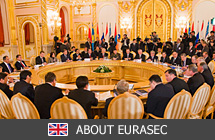
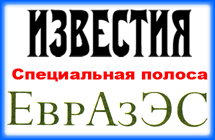
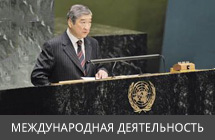
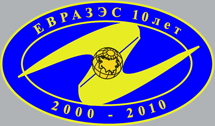
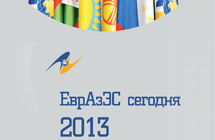
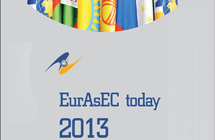
Поиск 10.10.2014 Заседание Межгосударственного совета ЕврАзЭС07.10.2014 Мультимедийная пресс-конференция в агентстве «Россия сегодня»03.10.2014 Встреча с Послом Финляндской Республики04.08.2014 Встреча Генерального секретаря ЕврАзЭС с Послом Республики Таджикистан20.06.2014 Премии Петербургского международного юридического форума «За вклад в развитие правовой интеграции на евразийском пространстве»28.05.2014 Договор о Евразийском экономическом союзе – важнейшее событие в новейшей истории наших стран25.05.2014 Презентация книги «Евразийский проект Нурсултана Назарбаева, воплощенный в жизнь. К 20-летию евразийского проекта 1994–2014»24.05.2014 VII АСТАНИНСКИЙ ЭКОНОМИЧЕСКИЙ ФОРУМ. Панельная сессия «Евразийской экономической интеграции – 20 лет. Итоги и перспективы»24.05.2014 VII Астанинский экономический форум и II Всемирная Антикризисная конференция, 21-23 мая 2014 года, Астана24.05.2014 Петербургский международный экономический форум, 23 – 24 мая 2014 года, Санкт-Петербург |

Евразийское экономическое сообщество
ЕврАзЭС
-
Страны участники
 Беларусь
Беларусь
-
 Казахстан
Казахстан
-
 Кыргызстан
Кыргызстан
-
 Россия
Россия
-
 Таджикистан
Таджикистан
-
 Узбекистан
Узбекистан
-
 Молдова
Молдова
-
 Украина
Украина



